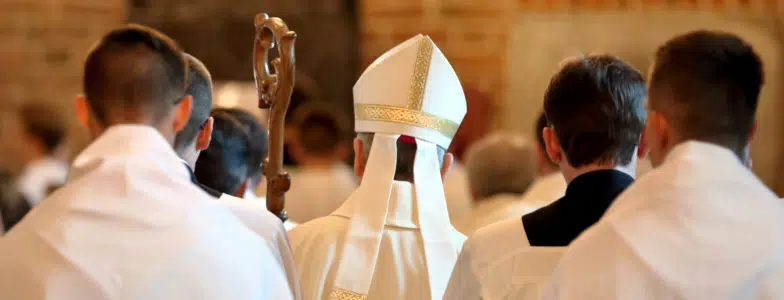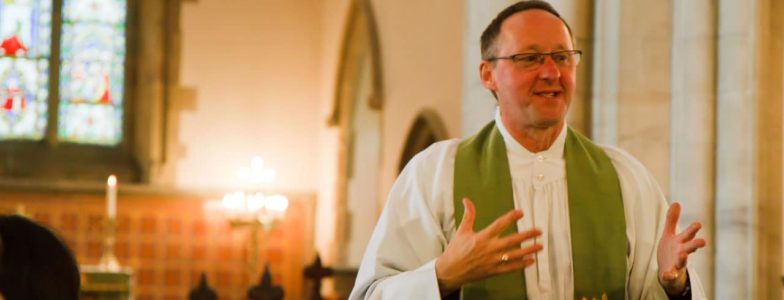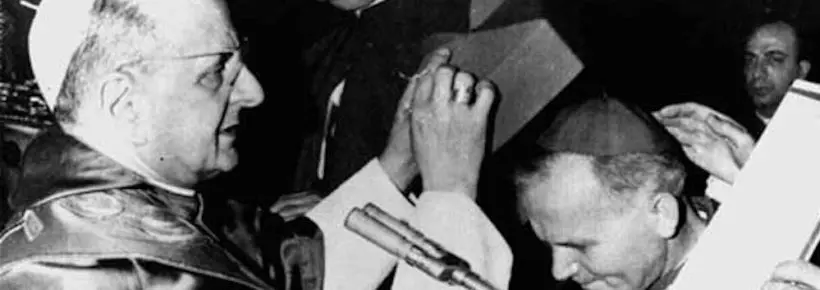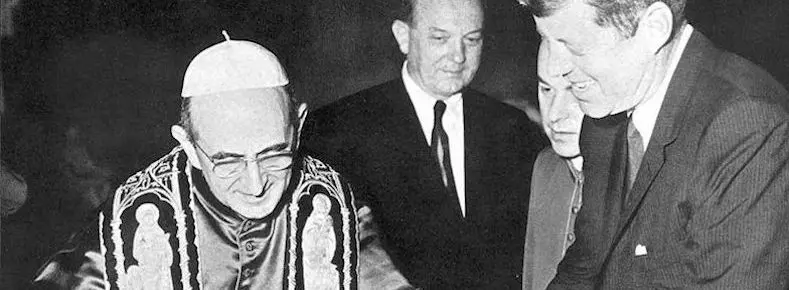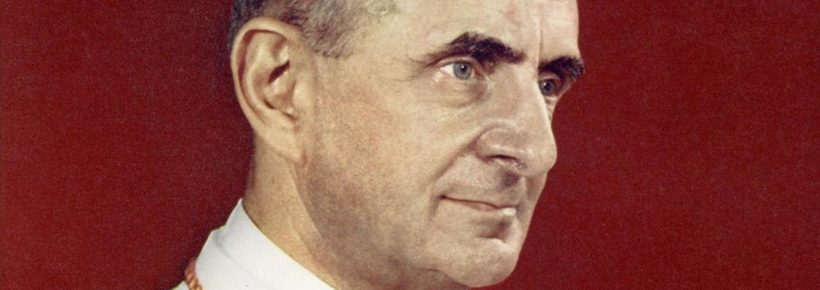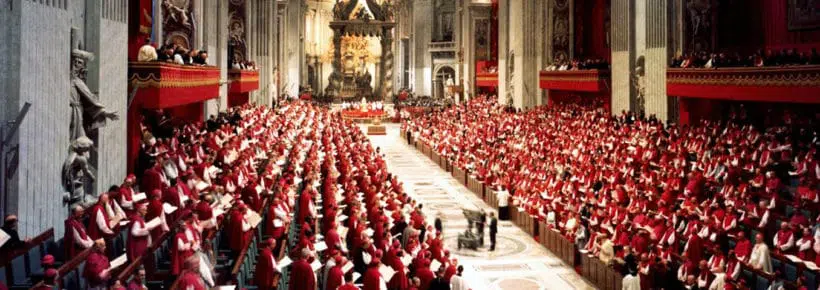Previous articles in this series:
- Part I: Introduction to Humanae Vitae
- Part II: The Predictions of Humanae Vitae
- Part III: The First Prophecy
- Part IV: The Second Prophecy
- Part V: The Third Prophecy
- Part VI: The Fourth Prophecy
- Part VII: Modernity’s Challenges to Humanae Vitae
- Part VIII: The Church’s Right to Teach on Birth Control
Later articles in this series:
- Part X: Principles of Humanae Vitae
- Part XI: The Moral Norm of Humanae Vitae
- Part XII: Doctrinal Objections to Humanae Vitae
- Part XIII: Pastoral Guidelines
In our previous article we answered the question of whether the Catholic Church has the right to teach about birth control as part of her teaching on the universal moral law. We answered this question in the affirmative, demonstrating that such teaching does belong to the natural law, and that Christ gave to His Apostles and their successors (the popes and bishops) the authority to pass on this teaching to the Church and to the world.
However, many Catholics are not practicing the teaching contained in Humanae Vitae, and some of them even question if this teaching is serious enough to require obedience.
To answer these questions we first need to discuss the nature of the Church’s teaching authority.
What Is the Church’s Teaching Authority?
Regarding this matter, the Church teaches us:
The task of giving an authentic interpretation of the Word of God, whether in its written form [the Bible] or in the form of Tradition [the teachings of the Church], has been entrusted to the living teaching office of the Church alone. Its authority in this matter is exercised in the name of Jesus Christ. This means that the task of interpretation has been entrusted to the bishops in communion with the successor of Peter, the Bishop of Rome. (Catechism of the Catholic Church [CCC] 85; see also Matt. 16:13-19, Luke 10:16)
This teaching of the Church does not mean that individual Catholics may not read and interpret the Bible or Sacred Tradition (the authoritative teachings of the Magisterium throughout history) in order to apply it to their lives. On the contrary, it means that the faithful should read and interpret the Bible correctly with the aid of the Magisterium, and in this way avoid falling into errors.
It is true that the teachings of the Bible concerning our salvation are infallible (CCC 107). But we are not infallible even with the help of the Holy Spirit. We need an authority within the Church that, when difficult doctrinal and moral questions arise, can assure us which teachings are infallibly true.
It would be of no use if everyone interpreted the Bible or the teachings of the Magisterium solely on their own individual authority. That would result in a huge mess! In fact, that mess has already happened and continues to happen as new Christian denominations pop up everywhere with their own interpretations of the Bible, sometimes even in contradiction with the interpretations of other denominations.
But Christ in His infinite love has provided us with such a body of authoritative teachers—the popes and the bishops who are in communion with the popes, all of whom are the successors of St. Peter and the rest of the Apostles. The Apostles in turn faithfully handed down the infallible teachings of Christ and of the Holy Spirit to the rest of the Church throughout the ages and across the world (CCC 83, 77).
All of the above does not mean that the Magisterium is superior the Word of God. On the contrary, it is only its servant:
Yet this Magisterium is not superior to the Word of God but is its servant. It teaches only what has been handed on to it. At the divine command and with the help of the Holy Spirit, it listens to this devotedly, guards it with dedication and expounds it faithfully. All that it proposes for belief as being divinely revealed is drawn from this single deposit of faith [the Bible and Sacred Tradition]. (CCC 86)
Infallibility: From Christ Himself
Let us consider a few excerpts from the Catechism (explanations below):
In order to preserve the Church in the purity of the faith handed on by the apostles, Christ who is the Truth willed to confer on her a share in his own infallibility. By a supernatural sense of faith the People of God, under the guidance of the Church’s living Magisterium, unfailingly adheres to this faith. (CCC 889)
This infallibility extends as far as does the deposit of divine Revelation; it also extends to all those elements of doctrine, including morals, without which the saving truths of the faith cannot be preserved, explained, or observed.… The authority of the Magisterium extends also to the specific precepts of the natural law because their observance, demanded by the Creator, is necessary for salvation. (CCC 2035-2036)
The exercise of this charism takes several forms:
The Roman Pontiff, head of the college of bishops, enjoys this infallibility in virtue of his office, when, as supreme pastor and teacher of all the faithful—who confirms his brethren in the faith he proclaims by a definitive act a doctrine pertaining to faith or morals…. the infallibility promised to the Church is also present in the body of bishops when, together with Peter’s successor, they exercise the supreme Magisterium, above all [but not only] in an Ecumenical Council. When the Church through its supreme Magisterium proposes a doctrine for belief as being divinely revealed, and as the teaching of Christ, the definitions must be adhered to with the obedience of faith. This infallibility extends as far as the deposit of divine Revelation itself.
Divine assistance is also given to the successors of the apostles [the bishops], teaching in communion with the successor of Peter, and, in a particular way, to the bishop of Rome, pastor of the whole Church, when, without arriving at an infallible definition and without pronouncing in a definitive manner, they propose in the exercise of the ordinary Magisterium a teaching that leads to better understanding of Revelation in matters of faith and morals. To this ordinary teaching the faithful are to adhere to it with religious assent which, though distinct from the assent of faith, is nonetheless an extension of it. (CCC 890-892, emphasis added)
Explanation
There are four key points to be made here.
Firstly, Christ endowed His Church with the charism or gift of infallibility. It couldn’t be any other way, since Christ is “the way, the truth, and the life” (John 15:6). How can Christ be the truth if what He is and taught were not infallible?
Because of His love for the Church, Christ gave to her, among many other truths, the gift of infallibility. It could not be any other way. How can Christ love His Church and then allow Her to fall into error? That’s an abomination! Besides, Jesus Himself promised His Church that “the gates of Hades (hell) shall not prevail against her” (Matt. 16:18).
Secondly, Christ gave the charism of infallibility in a special way to the pope, the successor of St. Peter and His representative on earth. It was necessary that Jesus did so in order to preserve the unity of truth within His Church in the midst of possible confusions.
Thirdly, He also gave this gift of infallibility to the bishops under special conditions:
- They must be in communion with the Pope
- They must meet with the Pope in an ecumenical council (a council of the whole Church) – think of the many councils where the Church defined important dogmas about the faith that the faithful already believed but that were cast into doubt by heretics. Among many examples, consider the Council of Nicea (325), where the bishops of the Church in communion with the pope (who could not be physically present) reaffirmed and defined the dogma of the divinity of Christ.
- Even though they are scattered throughout the earth, they must agree in communion with the pope that a particular doctrine or moral norm ought to be held as definitive. The assent required to an infallible doctrine, which is the highest assent possible, is called an assent of divine faith.
Notice again that this infallibility does not require a special declaration from the pope but is given by Christ to the ordinary magisterium of the bishops in communion with the pope. “The Magisterium of the Pastors of the Church [bishops and popes] in moral matters is ordinarily exercised in catechesis and preaching” (CCC 2033).
Fourthly, even if the proposed teaching is not declared infallible but is important for a better understanding of Revelation, especially in matters of faith and morals, it ought to be obeyed with an assent that is called religious assent. We are referring to serious teachings, and not to personal theological opinions, even those coming from popes, bishops, or theologians.
Is Humanae Vitae Infallible?
Before we answer this important question, let us briefly review three key points:
- A teaching of the Church does not have to be declared solemnly by the pope as infallible in order to actually be infallible.
- An infallible teaching of the Church can be given by the ordinary magisterium of the bishops even if they are scattered throughout the world and have lived at different times, as long as they are in communion with the pope and have taught that the particular doctrine of faith or morals ought to be held as definitive.
- A teaching of the Church does not have to be infallible in order to require obedience from the faithful. It suffices that the teaching leads to a better understanding of Revelation, especially in matters of faith and morals (this latter doctrines includes the natural law). The obedience that corresponds to this kind of teaching is a religious assent.
We at Human Life International and at Vida Humana Internacional firmly believe that the teaching contained in Humanae Vitae is infallible by the ordinary magisterium of bishops and popes. Examining the sources St. Paul VI alludes to, found in the footnotes of his encyclical, reveals the history of his teaching: the Church has consistently, formally and definitively condemned abortion, contraception, and sterilization, even in their primitive methods, since her beginnings over 2,000 years ago.
Brian Clowes, PhD, details the history of this teaching of the Church since ancient times in this great article: What Is Historical Church Teaching on Contraception?
And even if Humanae Vitae‘s teaching were not considered infallible, it certainly leads to a better understanding of Revelation, especially in the area of morals. As such, it would still require obedience in the form of religious assent.
Therefore, the teaching of Humanae Vitae should not be the object of dissent, no matter how cleverly disguised by gravely sinful pastoral advice such as “follow your conscience” or the other twisted “arguments” set forth by dissenting theologians, lay leaders or Catholics in the pew.
It is important to note that St. Paul VI ends his prophetic encyclical with a solemn call to the bishops:
And now as We come to the end of this encyclical letter, We turn Our mind to you, reverently and lovingly, beloved and venerable brothers in the episcopate, with whom We share more closely the care of the spiritual good of the People of God. For We invite all of you, We implore you, to give a lead to your priests who assist you in the sacred ministry, and to the faithful of your dioceses, and to devote yourselves with all zeal and without delay to safeguarding the holiness of marriage, in order to guide married life to its full human and Christian perfection. Consider this mission as one of your most urgent responsibilities at the present time. As you well know, it calls for concerted pastoral action in every field of human diligence, economic, cultural and social. If simultaneous progress is made in these various fields, then the intimate life of parents and children in the family will be rendered not only more tolerable, but easier and more joyful. And life together in human society will be enriched with fraternal charity and made more stable with true peace when God’s design which He conceived for the world is faithfully followed. (Humanae Vitae 30, emphasis added).
Previous articles in this series:
- Part I: Introduction to Humanae Vitae
- Part II: The Predictions of Humanae Vitae
- Part III: The First Prophecy
- Part IV: The Second Prophecy
- Part V: The Third Prophecy
- Part VI: The Fourth Prophecy
- Part VII: Modernity’s Challenges to Humanae Vitae
- Part VIII: The Church’s Authority on Family Planning Matters
Later articles in this series:
- Part X: Principles of Humanae Vitae
- Part XI: The Moral Norm of Humanae Vitae
- Part XII: Doctrinal Objections to Humanae Vitae
- Part XIII: Pastoral Guidelines
Related Content
Adolfo is the Director of Education for Hispanic Outreach for Human Life International and of HLI's Hispanic outreach arm Vida Humana Internacional. He has a Masters in Theology from St. Vincent de Paul Regional (Major) Seminary and a License in Moral Theology from the Alphonsian Academy in Rome.
Adolfo has traveled frequently to VHI’s affiliates in Latin America to give talks, training sessions, and media interviews. He has authored and co-authored books, articles, reports, and a pro-life training course for Hispanics in the U.S. Adolfo has also participated in the production of two TV pro-life series in Spanish, which have been aired through EWTN en Español.


